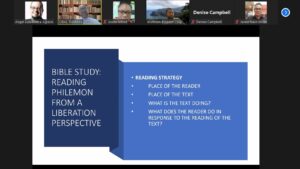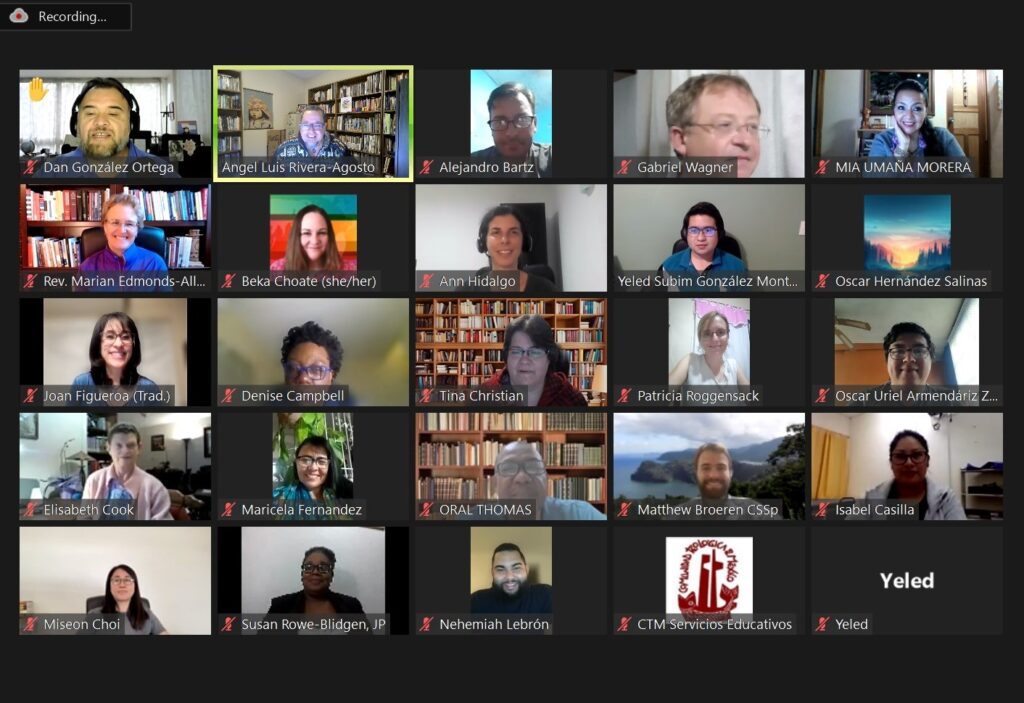Liberating Reflection and Praxis: The Voice of the Theology Students in the Americas

30 participants from 15 theological institutions from the U.S., Latin America, and the Caribbean participated in the Virtual Forum of Theology Students on January 24-25 and 27-28, 2022. The Virtual Forum consisted of four days of sessions, three hours each, for interpretations and mutual challenge reflections on four main elements: context, bible and theological tools, pastoral and prophetic practices, and partnership. Sociologists, Bible and Theology scholars, ecumenical leaders, and activists embedded in their sub-regions of the Continent shared an articulated reflection with them. Then, participants split into group discussions. A Synthesis Commission gathered and summarized the thoughts to develop suggestions on moving forward together, in solidarity with the themes and challenges shared throughout the week.
It is impossible to share the richness of the conferences, commentaries, and reflections shared by speakers and participants in a brief article. Here I will share just a glimpse of some of the thoughts and challenges expressed by students coming from the sub-regions of this Continent:
Latin America and the Spanish-speaking Caribbean students offered a reflection on the challenges they see in present times:
Latin America is a vast place, meek and helpful but tired of enduring plunder and dispossession. It is a place that needs to be rescued. We will surely be closest to achieving that goal in Latin American unity. Latin Americans are summoned by the same destiny, and we have no future without unity. I believe that the people must also be involved in the changes; nothing that happens behind the backs of the people will bring them any benefit. (Theology) students must engage and study this scenario of the possible change in light of God’s Word. Christian praxis in Latin America from Liberation Theology has as its subject the poor, the needy, and women and children who are the favorites of Christ. The change required is the rescue of this subject. We have a moral obligation to support and encourage change, take care of our people, and make any foreign intentions transparent to all, even if they could seem fine in appearance. The Latin American people should not be underestimated but deserve to sit at the dialogue table to participate in emancipatory movements that bring peace and reconciliation to the human race.
English-speaking Caribbean students shared some biblical and theological reflections on how to address some of the issues raised at the Forum:
We summarized our thoughts to express our central takeaways from our fruitful discussion. These include structural, ministerial, and anthropological/ontological aspects. First, in terms of structural points, (we have a) contrast of socio-economic realities in the (biblical texts) and the world, between rich and poor, colonizer and colonized center, and periphery. Second, in terms of ministerial points, (we) discussed the method of “see, seek, speak out, and serve.” We suggested that we must continue to speak out through serving and demonstrating equality in Christ which we believe.
Further, (we) mentioned that ministries in governments (in the English-speaking Caribbean) hardly ever include clergy, which presents a gap between prophetic voices on justice and the exercise of justice itself. It is clear and evident that this gap must be addressed if there is to be true exercise of prophetic justice. Lastly, in terms of anthropological/ontological points, (we) discussed the question of forging identities as critical in the search for global justice, such as those formed in Christ, in community, in the Church, etc. Ontology, which serves as the foundation of socio-political and economic realities, is a place of liberatory and emancipatory struggle. In that sense, subject-actor/individualistic ontology (i.e., colonial ontology) must be replaced with a relational ontology (theologically based in Social Trinitarianism of the Cappadocian Fathers and/or philosophically based in Édouard Glissant’s idea of Relation).
North American students defined their outcomes in the following way:
North America, specifically the United States, is a divided country. Black, brown, poor, and indigenous people do not have a voice and continue to be oppressed through economic systems that keep them impoverished and unable to access (benefits and rights as, for example, )health care. Using this lens, the North America group interpreted Matthew 15:21-28 to give a voice to the people, which leads to change. Through (the encounter) between the Canaanite woman and Jesus. Jesus’ ministry was changed from feeding the oppressors to feeding those oppressed. This passage speaks to reparations because the Canaanite woman told Jesus that she would not follow him, but he owed her and her people. The oppressors have a responsibility to those they have oppressed. This is a perspective that shows the difference between what is the oppressors’ right
(We made a particular emphasis) about the injustice done to people of color and how (activism is a way of) an expression and acknowledgment that Black Lives Matter. Using this lens, the North America group interpreted 1 Corinthians 1:27. “But God chose what is foolish in the world to shame the wise, those who are weak to shame the strong.” Here we see God’s call for those not considered persons turning the tables and guiding the way. Those who are not considered persons are spreading the good news. Our ministries need to be changed by the lives that do not matter today. We need to disrupt ourselves to transform our faith, coming away from the comfort zone.
The group shared some exciting directions. For example, participants want to create a Continental Network of Theology Students to follow up on the process held through the four days. Also, they suggested preparing joint liturgical tools for churches and communities and working in common curricula and webinars regarding themes like Empire, Ecology, Children’s Education, and Bible Reading and Context from Indigenous Cultures. The process will continue in 2022 and 2023 with similar events for Women Theologians, Professors, and a Continental Event on Theological Education and Praxis.

